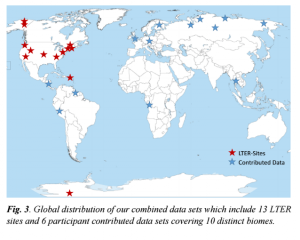In January, as part of its mission to enhance collaboration across the LTER network, the NCO called for Synthesis Working Group proposals. The request elicited 24 highly competitive proposals that together harnessed data from all 24 LTER sites. Selection was based on scientific merit, contribution to LTER Network science, and use of novel approaches.
We would like to congratulate the three proposals funded at this time:
Stream Elemental Cycling: Global Patterns in Stream Energy and Nutrient Cycling
Project PIs: Adam Wymore, LUQ (adam.wymore@unh.edu); Sujay Kaushal, BES (skaushal@umd.edu)
Project summary: Dissolved organic matter (DOM) provides a significant source of energy and nutrients to ecosystems and its biogeochemical cycling is inextricably linked to dissolved inorganic nitrogen (DIN). In stream ecosystems in particular, there is considerable spatial and temporal variation in the relationships between the different fractions of DOM (dissolved organic carbon and nitrogen) and DIN. Here we propose to use LTER data, as well as other data sources, to examine global patterns in the cycling of DOM and DIN. We ask the over-arching question: under what environmental conditions are the different fractions of DOM and DIN linked? We will examine the interaction between DOM and DIN among biomes ranging from tundra, boreal, desert, temperate forests, tall-grass prairies, and tropical rainforests. Compiling this unprecedented global database will also allow us to examine energy and nutrient cycling across seasons and environmental and management gradients. Our working group is comprised of leaders in the field of stream biogeochemistry, emerging early-career scientists and graduate and undergraduate students. Our synthesis will generate new results and insights, leading to high-profile publications relevant to our understanding of how streams regulate the export of energy
and nutrients.
A Synthesis to Identify How Metacommunity Dynamics Mediate Community Responses to Disturbance across the Ecosystems Represented in the LTER Network
Project PIs: Eric R. Sokol, MCM (eric.r.sokol@colorado.edu); Christopher M. Swan, BES (chris.swan@umbc.edu); Nathan I. Wisnoski, AND (wisnoski@indiana.edu)
Project Summary: Metacommunity ecology considers both the local- and regional-scale factors that influence community assembly. Previous work has identified dispersal, niche differentiation, and habitat heterogeneity as crucial parameters that determine metacommunity dynamics and stability in response to disturbance. However, it remains unclear whether the parameter combinations that are predicted to confer stability do so over long time scales and across ecosystem types. The ecosystems in the NSF Long-Term Ecological Research (LTER) network vary in habitat heterogeneity; likewise, the species assemblages within them exhibit varying degrees of niche differentiation and dispersal ability. Using LTER datasets, we aim to synthesize the general relationships between metacommunity parameters and stability across a diverse range of ecosystems and over long temporal scales. To do so, we will characterize metacommunity stability across a disturbance gradient, estimate metacommunity parameters, assess how well estimated parameters predict stability over time, and parameterize metacommunity simulation models with LTER data to identify the major predictors of metacommunity stability. Final products from this working group include an R package containing metacommunity time series datasets and relevant analyses, a synthesis of metacommunity stability and sensitivity to disturbance across the LTER network, and a prospectus detailing the application of simulations for understanding metacommunity dynamics.
Integrating Plant Community and Ecosystem Responses to Chronic Global Change Drivers: Toward an Explanation of Patterns and Improved Global Predictions
Project PIs: Kimberly J. La Pierre, KNZ/CDR/SGS (kimberly.lapierre@berkeley.edu); Meghan L. Avolio, KNZ (mavolio@sesync.org); Kevin R. Wilcox, KNZ/SGS (wilcoxkr@gmail.com)
Project Summary: Many global change drivers (GCDs) lead to chronic alterations in resource availability. As communities change through time in response to these GCDs, the magnitude and direction of ecosystem responses is also predicted to change in a on-linear fashion. We propose to examine whether plant community dynamics are predictive of shifts in ecosystem function across 101 long-term resource manipulation experiments (including 32 LTER experiments). Our working group will address three main objectives: 1) identify temporal patterns of plant community change in response to global change manipulations; 2) link these patterns of community change to changes in aboveground net primary productivity and carbon storage; and 3) incorporate community change into ecosystem models predicting functional responses to GCDs. These objectives address four of the five LTER core thematic areas (primary production, population studies, organic matter dynamics, and disturbance patterns/processes). Overall, we
will test current ecological theory to inform predictions of future responses to GCDs across a wide variety of terrestrial herbaceous systems, including those represented by 17 LTER sites. Funding from the LTER NCO will allow a diverse group of ecologists with expertise in modeling, statistical development, community ecology, and field experiments to come together to accomplish these objectives.











